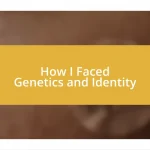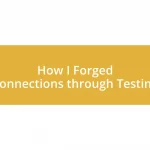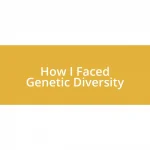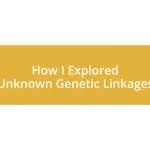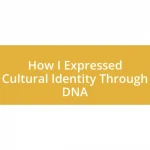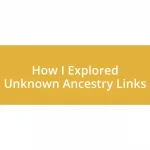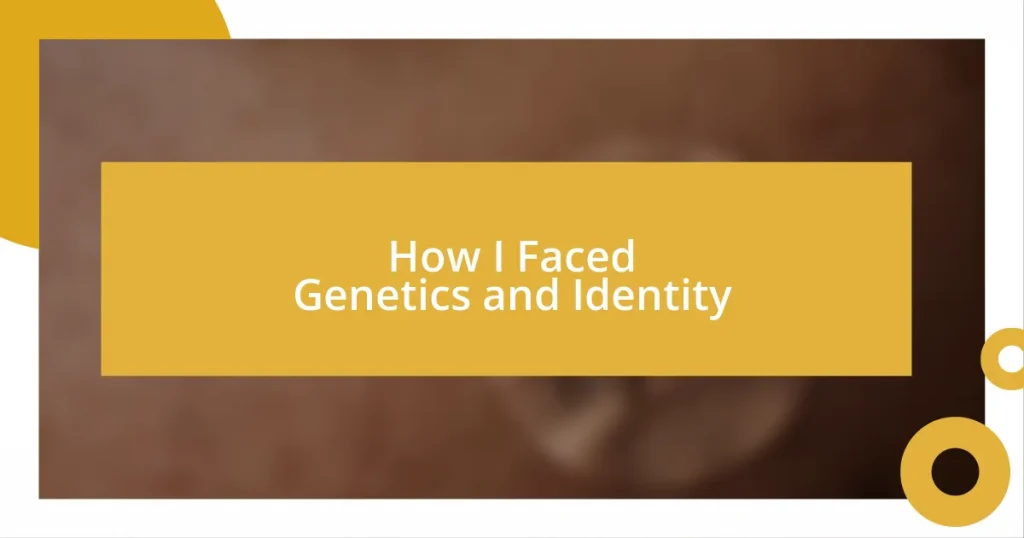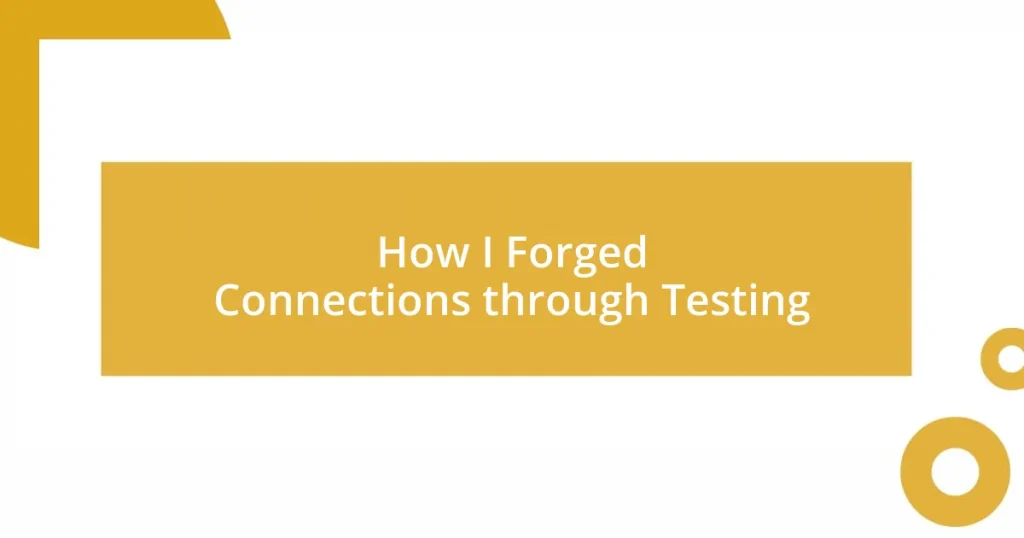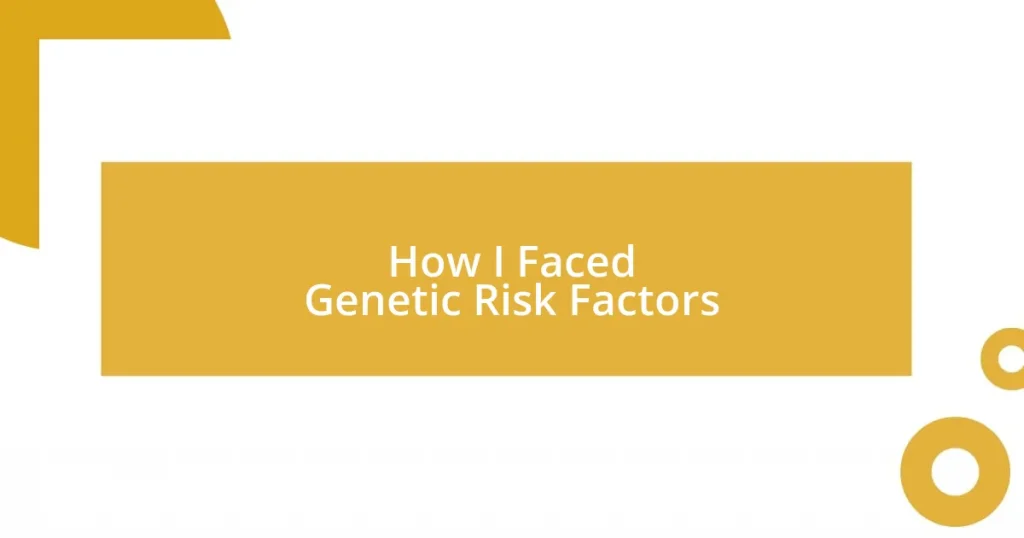Key takeaways:
- Genetics serves as a foundational aspect of identity, influencing both physical traits and emotional predispositions while being complemented by personal experiences and choices.
- Exploring family history and cultural traditions can enhance self-acceptance and create a deeper appreciation for one’s genetic heritage.
- Resilience can be built by reframing inherited traits as strengths, allowing for personal growth and deeper connections with others.
- Utilizing resources like DNA testing and community forums can uncover valuable insights and foster connections to one’s ancestry.
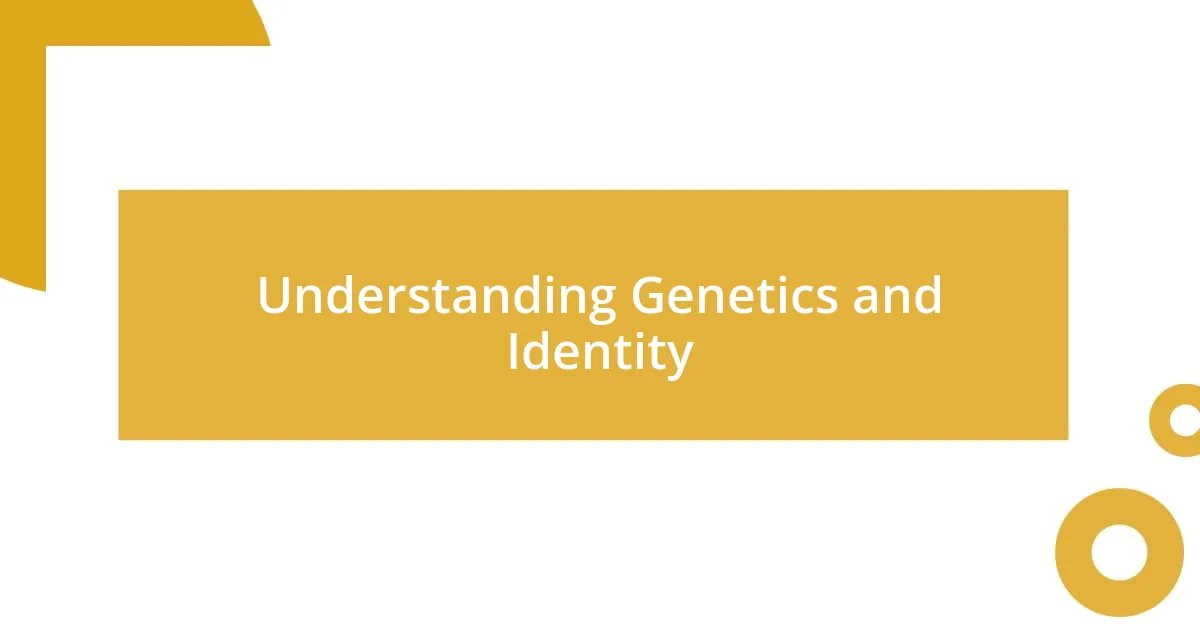
Understanding Genetics and Identity
Genetics often feels like a blueprint of who we are, but it’s only part of the story. I remember the first time I delved into my family tree; it was like unlocking a box of hidden pieces that collectively built my identity. Have you ever wondered how much of who you are is shaped by the genes you inherited compared to the experiences you’ve had?
As I explored my genetic makeup, I noticed traits passed down through generations—some amusing, others more complex, like some health conditions. This discovery wasn’t just academic; it stirred emotions as I reconciled the good and the bad within my lineage. Isn’t it fascinating how we can carry not just our ancestors’ features, but also their histories and struggles in our DNA?
Understanding genetics also taught me that identity is fluid, constantly influenced by our choices and surroundings. I’ve met people who share genetic markers with me but lead completely different lives, shaping their identities in unique ways. How do we balance these genetic factors with our personal experiences to form a true sense of self? The interplay between nature and nurture is a captivating journey I continue to navigate.
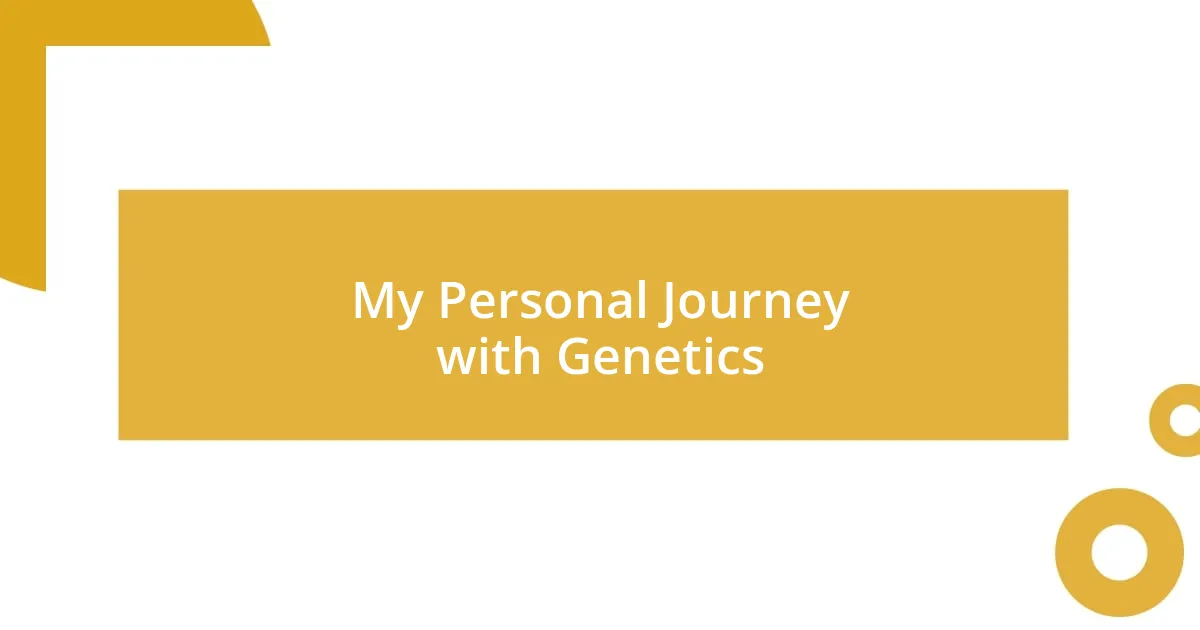
My Personal Journey with Genetics
As I dove deeper into my genetic background, I uncovered surprising connections to traits I never realized were part of my heritage. For instance, I’ve always struggled with a certain skin condition. When I discovered it had been prevalent in multiple generations of my family, it felt like gaining a clearer lens through which to view my own story. It was as if my skin was telling me a narrative about resilience that I had never fully acknowledged before.
- Each family member had their own unique challenges, leading me to appreciate the complexity of inherited traits.
- I often found myself contemplating how these genetic predispositions influence my daily choices, from my lifestyle habits to my self-care routines.
- Remarkably, it led me to embrace not only the physical aspects of my identity but also the emotional strength interwoven throughout my family’s history.
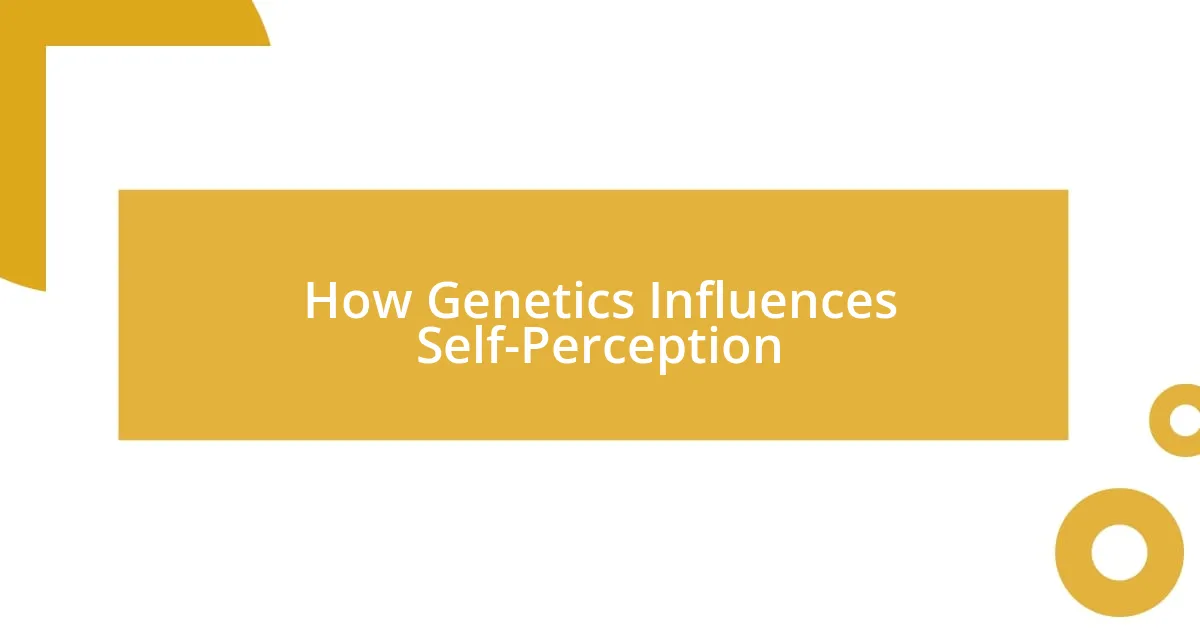
How Genetics Influences Self-Perception
Genetics can cast a long shadow over how we perceive ourselves. I vividly recall a moment during a family gathering when a relative pointed out the same nose shape that had been passed down in our family. At first, I felt self-conscious, but then it hit me: our characteristics are like stamps of our shared heritage, telling stories about where we come from. How many of us grapple with perceptions shaped by genetic traits that weren’t necessarily our choices but still impact how we view ourselves?
As I navigated this journey, I discovered that certain inherited traits can dictate not just physical appearances but also predispositions toward behaviors or emotions. For instance, my tendency to feel anxious in social settings seemed intertwined with familial patterns. This realization challenged me to redefine my self-image, transitioning from viewing anxiety as a flaw to recognizing it as a potential personality trait influenced by those genes I inherited. Isn’t it remarkable how genetics lays the groundwork for our personalities, creating a foundation upon which we build our identities?
Through all this reflection, I found freedom in acknowledging that genetics are merely a starting point. My life choices, experiences, and the relationships I cultivate ultimately shape my self-perception. I remember making a conscious effort to embrace my unique characteristics rather than hide them, similar to accepting the quirky traits of a beloved family member. In doing so, I not only nurtured my self-acceptance but also deepened my appreciation for the rich tapestry of identity that genetics alone cannot define.
| Genetic Influence | Personal Reflection |
|---|---|
| Physical Traits | Seen as heritage markers; an invitation to appreciate family connections. |
| Inherited Behaviors | Understanding the roots of anxiety led me to reshape my self-image positively. |
| Choices vs. Genetics | Recognizing that my identity is shaped equally by choices, experiences, and relationships. |
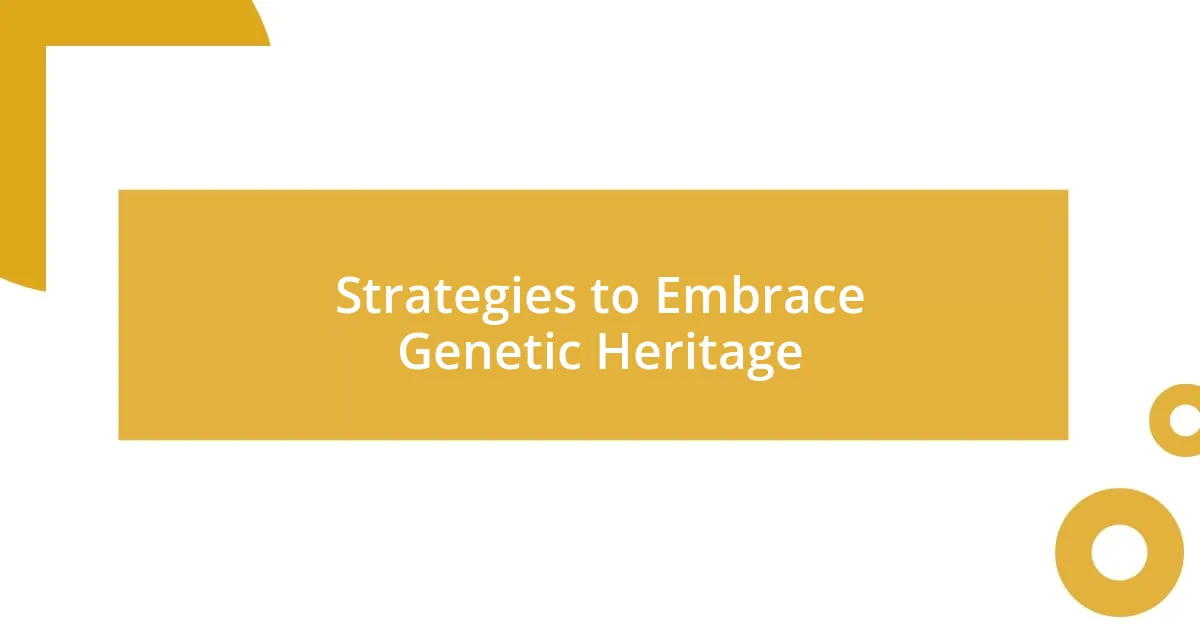
Strategies to Embrace Genetic Heritage
Embracing genetic heritage is about more than just acceptance; it’s a journey of discovery and connection. I remember the first time I attended a family reunion, surrounded by relatives who bore striking resemblances to my parents. It was enchanting to see pieces of myself reflected in them, from our shared laughter to similar mannerisms. This realization encouraged me to dive deeper into my family history, unearthing stories that brought warmth and a sense of belonging to my identity. Have you ever experienced that moment of recognition with your own family?
One strategy that worked wonders for me was documenting our family tree and recording personal stories from older relatives. Each tale became a thread connecting not just my ancestry but also my emotional landscape. I learned about my grandmother’s struggles during tough times, and in her story, I found a mirror reflecting my own challenges. This act of preserving knowledge felt empowering; it helped me accept parts of my genetic blueprint that I once viewed as burdens. How could we even begin to appreciate our own identity without understanding the rich narratives that shaped our ancestors?
Another impactful approach was celebrating cultural traditions unique to my heritage. I started incorporating family recipes into my cooking, each dish carrying flavors and memories that were passed down through generations. Preparing these meals felt like honoring my roots, grounding me in the present while embracing my lineage. Honestly, every bite shared with friends became an invitation to explore not just what I inherited genetically, but also the essence of who I am and where I come from. Isn’t it beautiful how food can connect us to our past while forging new memories in the present?
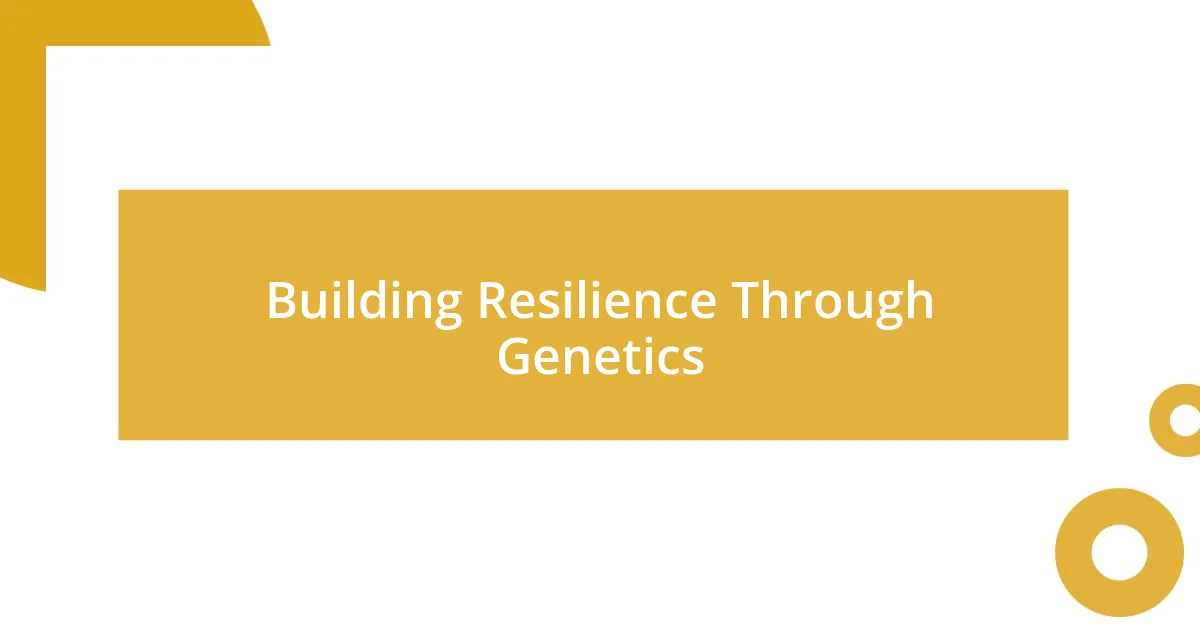
Building Resilience Through Genetics
Building resilience through genetics involves recognizing how our inherited traits shape not just who we are physically, but also how we respond to challenges. For instance, I often think back to my grandmother’s incredible resilience during hard times; she faced adversity with a strength that seemed embedded in my very DNA. I wondered, how could such tenacity come from her bloodline? Realizing that genetics could equip me with similar strengths if I chose to nurture them was eye-opening.
As I embraced my genetic makeup, I began to consciously transform inherited vulnerabilities into points of strength. There were times when I perceived my sensitivity as a burden, but I’ve learned to reframe it. In moments of deep connection with others, I realized this trait enables empathy—allowing me to build strong, supportive relationships. How lovely is it to think that what once felt like a weakness could be a key to establishing resilience in friendships and family ties?
This journey of self-discovery has taught me that resilience isn’t merely about overcoming challenges; it’s about understanding the intricate web of genetics and personal experience that shapes us. I remember a particularly trying day when I drew from this understanding, telling myself that my family’s history of perseverance could flow through me too. How liberating that thought was! It’s a reminder that each trait I’ve inherited, whether perceived as a gift or a struggle, can still contribute to a richer, more resilient identity.
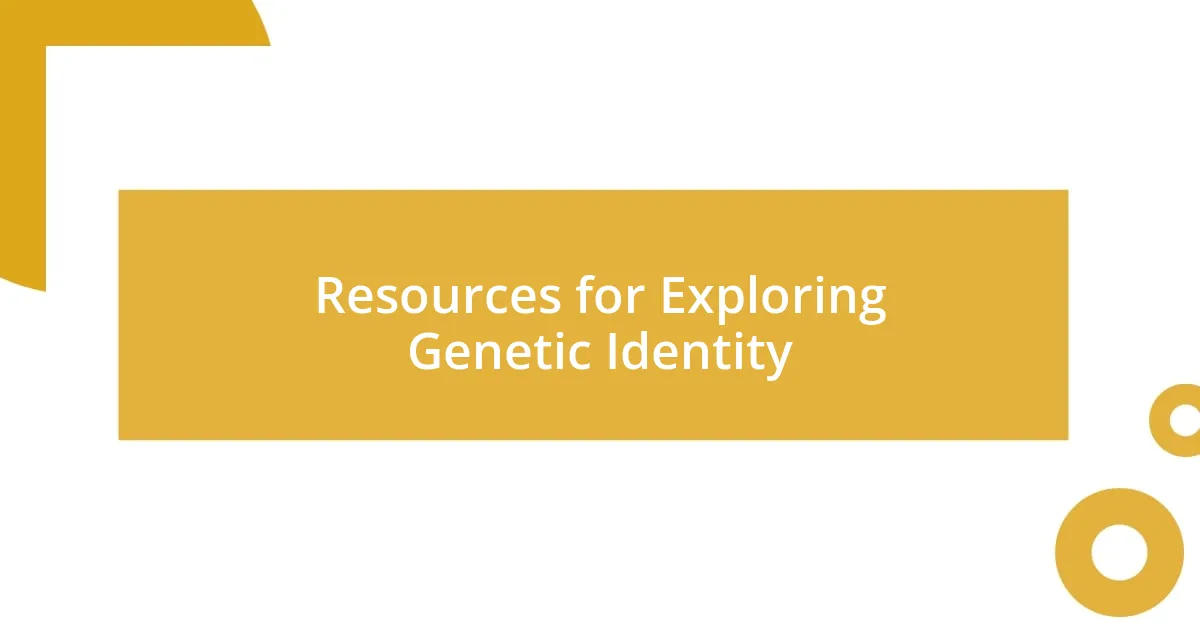
Resources for Exploring Genetic Identity
Exploring genetic identity can be a fascinating journey, and I’ve found several resources to help along the way. For starters, DNA testing services like AncestryDNA and 23andMe can provide not just health insights but also fascinating connections to distant relatives. I remember receiving my results; there was an indescribable excitement when I discovered I had relatives I never knew existed. It transformed how I viewed my family history, prompting me to reach out and connect with newfound cousins. Have you ever wondered how a simple test could open up a world of connection?
Another valuable resource for navigating genetic identity is online forums and communities such as MyHeritage and Genetic Affairs. After sharing my family tree on one of these platforms, I was pleasantly surprised by the support I received. People offered insight into shared ancestry, and I even discovered some unexpected cultural ties that I hadn’t considered before. It felt like being embraced by a large family—how cool is it to find solidarity in others’ experiences?
Books on genetic identity, like “The Gene: An Intimate History” by Siddhartha Mukherjee, can also be incredibly enlightening. I recall diving into his writing and feeling both challenged and inspired to think about my genetics in new ways. It sparked discussions with friends about identity and how we perceive ourselves based on our genetic makeup. Isn’t it intriguing how literature can expand our understanding and motivate personal growth?
